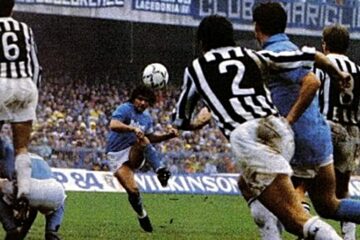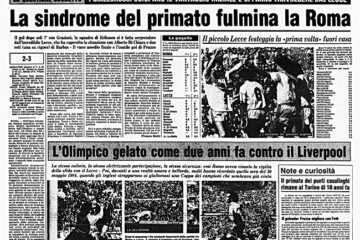When Italy rebelled against Italy: Cagliari shots with oranges the Azzurri National Team!
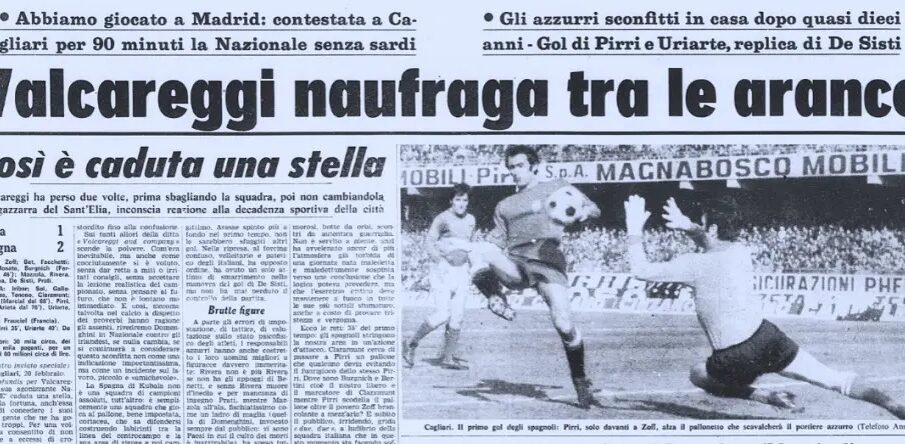
Prologue!
It had never happened before in sports, neither seen nor heard of, that a city rebelled against its own country. The exclusion of all the Cagliari players champion- Scudetto winning team from the “Azzurri” team unleashed the anger of an entire island, and a sensational revolt against the national team took place at Sant’Elia.
Everything was ready for the party. But the party didn’t happen. The throwing of vegetables began when the lineups were read.
Mameli’s anthem was booed loudly. It was the first time it had happened.
For Italy: Zoff, Bet, Facchetti….and down with boos!
From the stands the fans began to throw tomatoes, oranges, rolled up paper, anything that came within range.
Bertini, Rosato, Burgnich…
Boos, boos, boos!
There was an incongruous tension, considering the context.
Mazzola, Rivera, Boninsegna…
An anonymous hand threw a wooden crate onto the field, the kind used at the fruit market.
De Sisti, Prati….
Eleven Azzurri.
And not even one from Cagliari, the reigning Italian champions. A big problem, an embarrassing issue, or worse: a diplomatic incident.
1
The “Sant’Elia” stadium shone like never before under the February sun of 1971. It was much more than just a stadium: it represented the fulfillment of a dream, the temple of a team that had rewritten the geography of Italian football.
For the first time in history, the Scudetto had emigrated to an island. Scopigno’s Cagliari had accomplished the feat the previous year, dominating the championship with spectacular and concrete football.
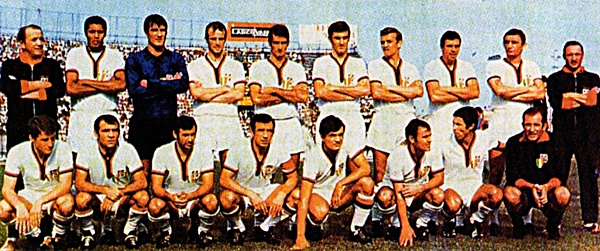
Cagliari – Campione D`Italia 1969-1970
But 1970 had not only brought the Scudetto. That same summer, five Cagliari players had experienced the World Cup adventure in Mexico.
Albertosi between the posts, confident and authoritative. Cera, the elegant libero, Niccolai, a rough but effective stopper and Domenghini, the fast and technical winger. And then him, Gigi Riva, the bomber who made defenses all over Europe tremble.
The city was living a magical moment. The new stadium was the tangible symbol of this golden age: modern, spacious, worthy of a great European team.
The stands of Sant’Elia had welcomed the public of the big occasions that season, with fans who flocked from all over the island to see their favorites defend the tricolor.
The nightmare materialized on an autumn evening at the Prater in Vienna. On October 31, 1970, during a friendly against Austria, Riva collapsed to the ground after a collision. The diagnosis was merciless: a fractured tibia and fibula.
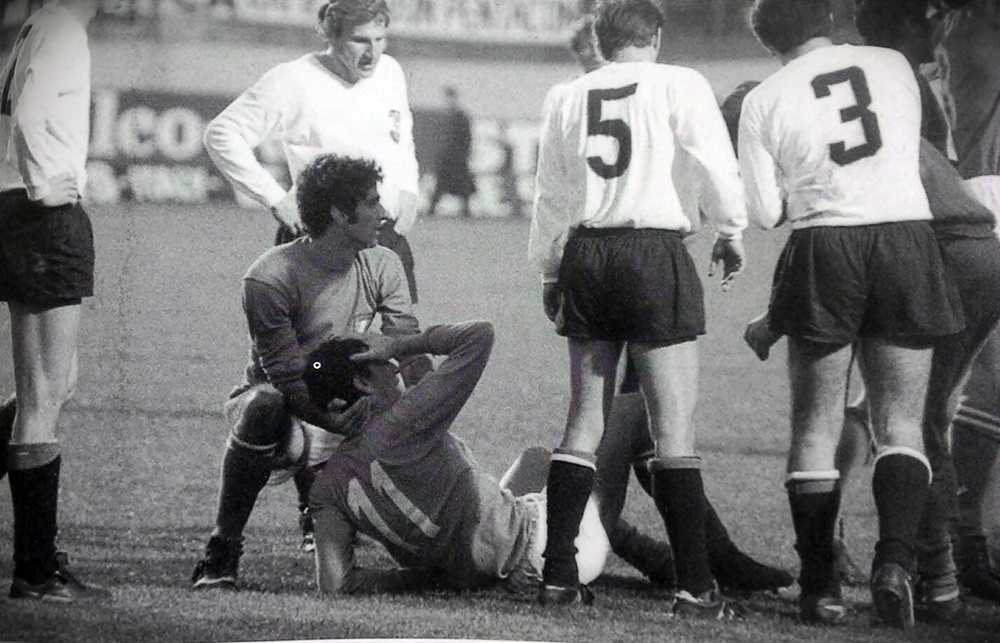
The injury of Riva
For the Sardinian striker it was a terrible déjà vu: already in March 1967, during Italy-Portugal in Rome, he had suffered the same injury.
This time, however, the drama had an even more bitter taste. Cagliari was flying in the championship, it seemed launched towards a historic championship-bis. Riva was in the best moment of his career, fresh from the Mexican World Cup where he had enchanted the world with his prowess.
The injury not only shattered his leg, but also the dreams of an entire island. The team took the blow. Without its leader, Cagliari gradually lost ground in the championship. The fans could not help but think that, once again, it was the blue jersey that had “stolen” their champion at the decisive moment.
2.
Artemio Franchi, president of the Football Federation, was a seasoned man. He understood that something had to be done to mend the rift with Cagliari. The choice fell on a luxury friendly: Italy-Spain to be played at the Sant’Elia. On paper, it seemed like the perfect opportunity: a prestigious match, a good guaranteed takings, the possibility of reconciling the environment.
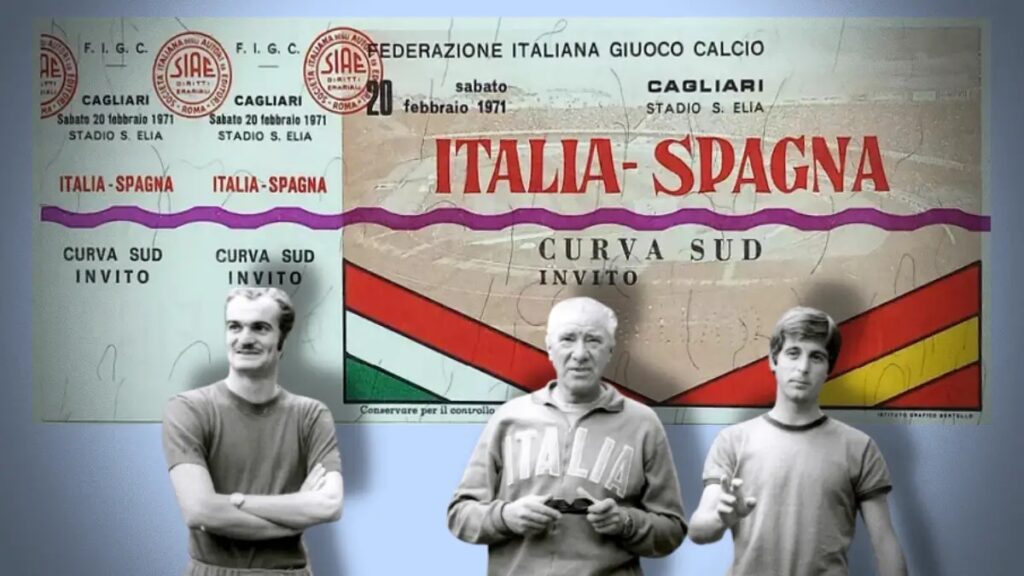
The Football Federation had prepared everything down to the smallest detail. Two gold tokens awaited Riva, a symbolic tribute to thank him for the sacrifices he made for the blue jersey. Franchi himself wanted to deliver them to him.
But the striker had other plans and when the national team gathered in Santa Margherita di Pula, a charming seaside village a few kilometers from Cagliari, there was no trace of Riva.
His silence was eloquent. His absence from the retreat, more than a gesture of protest, seemed like a way to avoid finding himself in an uncomfortable situation. Riva was a man of few words, but his gestures spoke clearly. The “gift” from the Football Federation was already showing the first cracks.
The fuse is lit
But it was Ferruccio Valcareggi’s decisions that ignited the bomb. The coach, perhaps underestimating the context or perhaps rigidly following his technical convictions, decided to exclude all Cagliari players from the starting eleven. Not one, not two, but all of them: Albertosi, Niccolai, Domenghini, Gori, relegated to the bench as extras.
The news exploded like a bolt from the blue two days before the match. The local newspapers went wild. The Unione Sarda ran a full-page headline saying
“Slap to Cagliari.”
The city mobilized in a way never seen before. Sporting goods stores recorded a curious phenomenon: while tickets for the game remained unsold, whistles were snapped up.
Five thousand pieces, one after the other, as if the city was preparing for a protest demonstration rather than a football match.
Local radio stations became the megaphone of discontent. Fans called to express their indignation. Former Cagliari players were interviewed and, although diplomatically, did not hide their disappointment. The tension rose hour after hour.
3.
The day of the protest
On February 20, 1971, Sant’Elia was transformed into a theater of the absurd. Hours before kick-off, the atmosphere was electric. Fans arrived in groups, whistles around their necks and signs under their arms. “Viva España” was written on some. “Valcareggi go away” was written on others. The north curve, usually the heart of the rossoblù fans, was a sea of Spanish flags.

Azzurri Team of the 1970
When the teams took to the field to warm up, it was clear that it would not be a normal evening. The Spanish players were greeted with applause, the Italian ones with a volley of whistles. But the most surreal moment was yet to come. At the national anthem, traditionally a moment of unity and respect, Sant’Elia responded with a deafening concert of whistles. Never, in the history of Italian football, had anything like it been seen.
The triumph of the guests!
On the pitch, Kubala’s Spain seemed to be playing at home. Iribar, Amancio and Pirri, stars of Real Madrid, moved with the confidence of those who know they have the crowd on their side. The Italian defense, on the other hand, seemed nervous, distracted.
The first blow came in the 35th minute: a magnificently orchestrated move by Claramunt found Pirri with an illuminating pass. The Azzurri defense was caught on the counterattack, Burgnich and Bertini looked like two ghosts while Zoff, groping in mid-air, could do nothing as he saw Pirri scoop the ball into the net.
The crowd erupted in a roar, but not in disappointment. Instead, they began to chant “two, two” rhythmically, as if they wanted to push the Spaniards to inflict an even more severe punishment on the Azzurri.
And Spain didn’t need to be asked twice. After just five minutes, Claramunt started the action again: this time he found Churruca, who sent Rivera to the bar with a feint. The ball reached Uriarte who, launched like a bison, slammed the ball into the top corner.
Sant’Elia exploded with joy, as if Cagliari had scored. De Sisti’s consolation goal, which came at the end after a confused melee, was greeted almost with annoyance by the crowd.
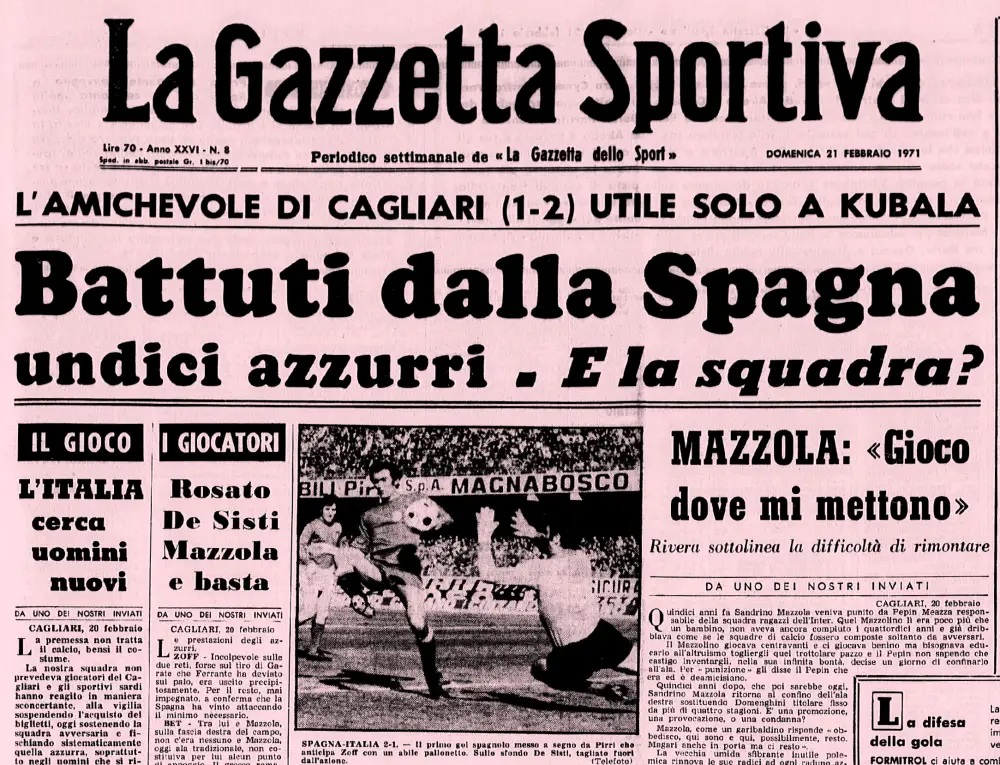
4
The voices of the post-match
In the locker room, the atmosphere was heavy. Albertosi, from the bench, had experienced a surreal evening: “I didn’t expect a demonstration of this proportion,” he confessed to reporters. “I thought that at a certain point the people would cheer for Italy. I feel sorry for Zoff above all.”
Domenghini seemed the most upset: “I was sitting on the bench and I felt guilty. I have never been invoked so much by the fans. I feel sorry for Mazzola, I wanted to apologize to him.” His discomfort was palpable: being there, on the bench, while the crowd chanted his name as an accusation against Valcareggi.
Manlio Scopigno, the “philosopher” coach of Cagliari, analyzed the situation with his usual lucidity: “The reaction of the public to Domenghini’s exclusion was logical. It would have happened in any other Italian city.” It was his way of saying that Valcareggi had made an unforgivable error of judgment.
5.
The bitter epilogue
The Spanish newspapers had fun recounting that surreal evening. “Spain won the game of oranges,” they headlined in Madrid, referring to the fruits thrown at the Azzurri at the end of the match. But beyond the anecdote, there was a deep fracture that had occurred that evening.
The Football Federation reacted in the worst possible way: it erased Cagliari from the map of cities that would host the national team. A short-sighted decision that did nothing but confirm what the Sardinians thought: that the central power did not understand or did not want to understand the deep reasons for that protest.
Riva, with his proverbial reserve, had followed the match on the radio at the club headquarters. His comment was minimal but significant: “There are those who follow football in one way and those who follow it in another. We are made like that. The reaction of our fans is understandable, human.” In those few words there was everything: the pride of a people, the sense of belonging, the wounded dignity.
The end of exile.
Eighteen years. It took that long for the wound to heal, for the National team to find the courage to return to that land that had so resoundingly rejected it. It was December 21, 1989 when Sant’Elia reopened its doors to the Azzurri, on an evening that smelled of reconciliation.
It was not just any match. In front of them was Diego Armando Maradona’s Argentina, the reigning world champion. Azeglio Vicini’s Italy was preparing for Italia ’90, the World Cup at home, and that challenge represented an important test. But beyond the technical aspect, the choice of opponent was not casual: a prestigious match was needed to seal the peace.
The final score of 0-0 tells little about that evening. It was a dull match, without much emotion, as often happens in end-of-year friendlies.
But the real result was not on the field: it was in the stands, where the Sardinian fans showed that time can heal even the deepest wounds. This time there were no whistles, there were no protests. And above all, as the journalists of the time noted with relief, no oranges flew.
New York: April 10, 2025
________________
Sports Vision + Plus / Champions Hour in activity since 2013.
Discover more from Sports Vision +
Subscribe to get the latest posts sent to your email.


